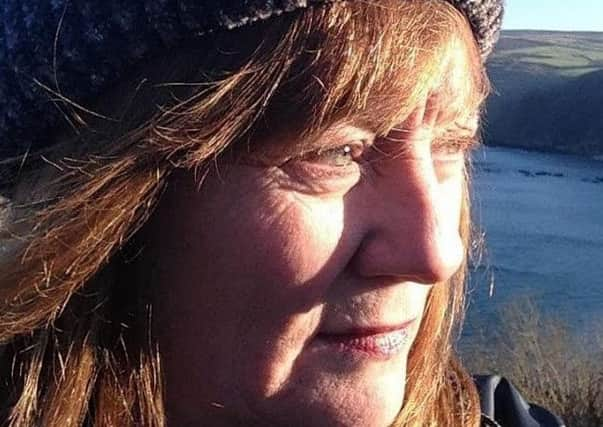Pioneering treatment first for Derry woman


Members of Rosaline Callaghan’s family were some of the first to be diagnosed with the hATTR Ala 60 strain of the condition, which is hereditary and was until now, terminal.
While there are different types of Amyloidosis, hATTR strain is thought to originate from a 15 mile stretch of coastline in Donegal .
Advertisement
Hide AdAdvertisement
Hide AdIt came to public attention recently following the death of former Deputy First Minister, Sinn Fein’s Martin McGuinness from the condition.
It also claimed the life of Rosaline’s father in 1997, as well as other family members in 1982 and 2017.
But, thanks to the research and dedication of staff at London’s Royal Free Hospital, within which the National Amyloidosis Centre is based, a new gene-silencing drug called Patisiran has been made available and Rosaline will ‘become the first person’ in her family diagnosed with hATTR ‘not to die from this disease.’
Patisiran stops the progression of hATTR Amyloidosis, in which abnormal protein deposits, called amyloid, form in the body’s tissues, most often in the heart, kidneys and nervous system. The deposits damage the tissues and interfere with how the organs work. There are different types of Amyloidosis but familial amyloidosis is most often fatal. Patisiran works by ‘silencing’ the gene and lowering the level of the toxic protein. It has been found to not only stop the progression of the condition, but also reverse it in some cases. It was approved for use in Northern Ireland in the last two months and Rosaline is the first person from her who will avail of it.
Advertisement
Hide AdAdvertisement
Hide AdThe retired barrister told the ‘Journal’ how, following the death of her aunt and father Hugh Charles, both from Burt, she knew the condition was ‘coming’ for her. In 2007, she was tested at the Royal Free to determine if she carried the faulty gene and it was confirmed she did. She quit her job as a barrister to travel the world and a few months ago, when she began to experience ‘sudden’ symptoms, she knew what it was. It was confirmed at the Royal Free Hospital earlier this week that she is in the early stages of Amyloidosis. It was also confirmed that she will be able to be treated with Patisiran.
‘not the death sentence it was’
Rosaline stressed that the drug is only beneficial to those with amyloid deposits in their heart and nervous system, as she has. Some people have it solely in their heart and it will sadly, as yet, not benefit them.
She told how, without the drug, she would be ‘in a wheelchair within three years.’
But with it, the hereditary Amyloidosis she has ‘is not the death sentence it once was.’
Advertisement
Hide AdAdvertisement
Hide AdRosaline is urging doctors and patients to consider Amyloidosis when investigating or diagnosing conditions. She is also asking everyone to be aware of their family history.
She told how she was contacted by a man from Australia, who following a DNA ancestry search, was flagged up as someone at risk of familial Amyloidosis. His great-grandmother hailed from Carrigart in Donegal, as did Rosaline’s.
Unfortunately, his brother has passed away and Patisiran is not yet available in Australia.
Rosaline said she becomes emotional when she recalls how others, including her father, did not have access to the drug. But, she is comforted by the fact that it offers hope for those in generations to come, something her father wished to happen. “When my father was in hospital in Belfast, experts came from all over the world to see him and learn from him. One day, they were removing nerves from his foot and he said; ‘I know you can do nothing for me, but please take all you can to help the ones coming after.’ That makes me weep, but because of him and everyone who we have loved and lost, the treatment is there for the people to come now.”
Advertisement
Hide AdAdvertisement
Hide AdRosaline has developed Bilateral Carpel Tunnel Syndrome and has amyloid deposits in her heart, currently graded one half in a range up to three. Her other symptoms include difficulty with walking, numbness and electric shocks in her legs.
early treatment vital
As the condition is ‘slow moving,’ if it is found that the levels in her nervous system are at a low level, she will be reviewed again in a year’s time. If they are high, she will begin Patisiran straight away. It will be administered at the Royal Free hospital initially and then at her local hospital here in Derry.
As it is vitally important to begin treatment in the early stages of Amyloidosis, Rosaline asked everyone to be aware.
“I’ve presented to the Royal Free Hospital a couple of years in advance of most others. This was because I knew what I was looking for in relation to symptoms.
Advertisement
Hide AdAdvertisement
Hide Ad“Because there can be such a cluster of symptoms, experts predict that people are going to their doctor for three or four years before the amyloidosis comes up. So, please be aware of your Donegal ancestry - especially now there is a treatment. This is no longer a death sentence. What was once a fatal disease has now become a chronic condition.”
Anyone who wishes to find out more about familial amyloidosis can contact Rosaline at [email protected]